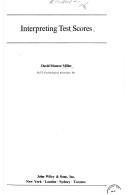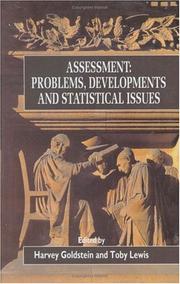| Listing 1 - 7 of 7 |
Sort by
|

ISBN: 047160609X 9780471606093 Year: 1972 Publisher: New York, NY : John Wiley,
Abstract | Keywords | Export | Availability | Bookmark
 Loading...
Loading...Choose an application
- Reference Manager
- EndNote
- RefWorks (Direct export to RefWorks)
Examinations --- Interpretation --- Interpretation. --- Examinations - Interpretation
Periodical
Abstract | Keywords | Export | Availability | Bookmark
 Loading...
Loading...Choose an application
- Reference Manager
- EndNote
- RefWorks (Direct export to RefWorks)

Abstract | Keywords | Export | Availability | Bookmark
 Loading...
Loading...Choose an application
- Reference Manager
- EndNote
- RefWorks (Direct export to RefWorks)
Mathematical statistics --- Education--Tests et mesures --- Educational tests and measurements --- Onderwijs--Tests en metingen --- Opvoedkunde--Tests en metingen --- Opvoedkundige tests en metingen --- Test bias --- Tests -- Déformations --- Tests et mesures en éducation --- Testvertekening --- Educational tests and measurements. --- Examinations --- Test bias. --- Lerarenopleiding --- Statistics. --- Interpretation. --- Validity. --- (vak)didactiek wetenschappen --- (vak)didactiek wetenschappen. --- Statistics --- Evaluation --- Validity --- Interpretation (Phrasing, dynamics, etc.) --- Educational tests and measurements - Statistics. --- Examinations - Validity. --- Examinations - Interpretation.
Book
ISBN: 2804002454 9782804002459 Year: 1987 Volume: vol *110 Publisher: Bruxelles Labor
Abstract | Keywords | Export | Availability | Bookmark
 Loading...
Loading...Choose an application
- Reference Manager
- EndNote
- RefWorks (Direct export to RefWorks)
Education--Tests et mesures --- Educational tests and measurements --- Enseignement --- Onderwijs --- Onderwijs--Tests en metingen --- Opvoedkunde--Tests en metingen --- Opvoedkundige tests en metingen --- Tests et mesures en éducation --- Examinations --- Multiple-choice examinations --- Evaluation --- Interpretation --- Contrôle de qualité --- quality controls --- Évaluation --- evaluation --- Méthode pédagogique --- Teaching methods --- Utilisation --- uses --- -Examinations --- -Multiple-choice examinations --- Didactique Didactiek --- Evaluation Evaluatie --- Sélection du personnel Personeelsselectie --- Enseignement Onderwijs --- Competitive examinations --- Tests --- Questions and answers --- Interpretation and construction --- Interpretation of examinations --- Test interpretation --- Test results --- Validity --- Examinations - Evaluation --- Examinations - Interpretation

ISBN: 0309084725 9786610183531 1280183535 0309500060 9780309500067 9780309084727 0305084725 0309169380 Year: 2002 Publisher: Washington, DC National Academy Press
Abstract | Keywords | Export | Availability | Bookmark
 Loading...
Loading...Choose an application
- Reference Manager
- EndNote
- RefWorks (Direct export to RefWorks)
English language -- Study and teaching -- Foreign speakers. --- Examinations -- Interpretation. --- Students with disabilities. --- Examinations --- Education --- Social Sciences --- Theory & Practice of Education --- Interpretation --- English language --- Interpretation. --- Study and teaching --- Foreign speakers. --- EFL (Language study) --- English as a foreign language --- English as a second language --- English to speakers of other languages --- ESL (Language study) --- ESOL (Language study) --- Teaching English as a second language --- TEFL (Language study) --- TESL (Language study) --- Handicapped students --- Interpretation of examinations --- Test interpretation --- Test results --- Foreign students --- People with disabilities --- Validity --- Germanic languages
Book
ISBN: 1493903160 1493903179 Year: 2014 Publisher: New York, NY : Springer New York : Imprint: Springer,
Abstract | Keywords | Export | Availability | Bookmark
 Loading...
Loading...Choose an application
- Reference Manager
- EndNote
- RefWorks (Direct export to RefWorks)
This book provides an introduction to test equating, scaling, and linking, including those concepts and practical issues that are critical for developers and all other testing professionals. In addition to statistical procedures, successful equating, scaling, and linking involves many aspects of testing, including procedures to develop tests, to administer and score tests, and to interpret scores earned on tests. Test equating methods are used with many standardized tests in education and psychology to ensure that scores from multiple test forms can be used interchangeably. Test scaling is the process of developing score scales that are used when scores on standardized tests are reported. In test linking, scores from two or more tests are related to one another. Linking has received much recent attention, due largely to investigations of linking similarly named tests from different test publishers or tests constructed for different purposes. In recent years, researchers from the education, psychology, and statistics communities have contributed to the rapidly growing statistical and psychometric methodologies used in test equating, scaling, and linking. In addition to the literature covered in previous editions, this new edition presents coverage of significant recent research. In order to assist researchers, advanced graduate students and testing professionals, examples are used frequently, and conceptual issues are stressed. New material includes model determination in log-linear smoothing, in-depth presentation of chained linear and equipercentile equating, equating criteria, test scoring, and a new section on scores for mixed-format tests. In the third edition, each chapter contains a reference list, rather than having a single reference list at the end of the volume The themes of the third edition include: * the purposes of equating, scaling and linking and their practical context * data collection designs * statistical methodology * designing reasonable and useful equating, scaling, and linking studies * importance of test development and quality control processes to equating * equating error, and the underlying statistical assumptions for equating.
Examinations -- Interpretation. --- Examinations -- Scoring. --- Examinations --Design and construction. --- Mathematical statistics. --- Psychological tests --Standards. --- Examinations --- Psychological tests --- Educational tests and measurements --- Education --- Social Sciences --- Theory & Practice of Education --- Scoring --- Interpretation --- Design and construction --- Standards --- Scoring. --- Interpretation. --- Design and construction. --- Standards. --- Educational assessment --- Educational measurements --- Mental tests --- Tests and measurements in education --- Psychological assessment --- Tests, Psychological --- Test construction --- Test design --- Interpretation of examinations --- Test interpretation --- Test results --- Remote scoring of examinations --- Scoring of examinations --- Self-scoring of examinations --- Test scoring --- Statistics. --- Assessment. --- Psychometrics. --- Statistics for Social Science, Behavorial Science, Education, Public Policy, and Law. --- Assessment, Testing and Evaluation. --- Statistics for Social Science, Behavioral Science, Education, Public Policy, and Law. --- Measurement, Mental --- Measurement, Psychological --- Psychological measurement --- Psychological scaling --- Psychological statistics --- Psychology --- Psychometry (Psychophysics) --- Scaling, Psychological --- Scaling (Social sciences) --- Statistical analysis --- Statistical data --- Statistical methods --- Statistical science --- Mathematics --- Econometrics --- Measurement --- Scaling --- Methodology --- Psychological tests for children --- Psychometrics --- Students --- Testing --- Clinical psychology --- Rating of --- Validity --- Educational tests and measuremen. --- Statistics for Social Sciences, Humanities, Law. --- Statistics .
Book
ISBN: 0387981373 9786612973604 1282973606 0387981381 9780387981376 9780387981383 Year: 2011 Publisher: New York : Springer,
Abstract | Keywords | Export | Availability | Bookmark
 Loading...
Loading...Choose an application
- Reference Manager
- EndNote
- RefWorks (Direct export to RefWorks)
The goal of this book is to emphasize the formal statistical features of the practice of equating, linking, and scaling. The book encourages the view and discusses the quality of the equating results from the statistical perspective (new models, robustness, fit, testing hypotheses, statistical monitoring) as opposed to placing the focus on the policy and the implications, which although very important, represent a different side of the equating practice. The book contributes to establishing “equating” as a theoretical field, a view that has not been offered often before. The tradition in the practice of equating has been to present the knowledge and skills needed as a craft, which implies that only with years of experience under the guidance of a knowledgeable practitioner could one acquire the required skills. This book challenges this view by indicating how a good equating framework, a sound understanding of the assumptions that underlie the psychometric models, and the use of statistical tests and statistical process control tools can help the practitioner navigate the difficult decisions in choosing the final equating function. This book provides a valuable reference for several groups: (a) statisticians and psychometricians interested in the theory behind equating methods, in the use of model-based statistical methods for data smoothing, and in the evaluation of the equating results in applied work; (b) practitioners who need to equate tests, including those with these responsibilities in testing companies, state testing agencies, and school districts; and (c) instructors in psychometric, measurement, and psychology programs. Dr. Alina A. von Davier is a Strategic Advisor and a Director of Special Projects in Research and Development at Educational Testing Service (ETS). During her tenure at ETS, she has led an ETS Research Initiative called “Equating and Applied Psychometrics” and has directed the Global Psychometric Services Center. The center supports the psychometric work for all ETS international programs, including TOEFL iBT and TOEIC. She is a co-author of a book on the kernel method of test equating, an author of a book on hypotheses testing in regression models, and a guest co-editor for a special issue on population invariance of linking functions for the journal Applied Psychological Measurement.
Educational tests and measurements -- Evaluation. --- Examinations -- Design and construction. --- Examinations -- Interpretation. --- Examinations -- Scoring. --- Psychological tests -- Standards. --- Scaling (Social sciences). --- Social sciences -- Statistical methods. --- Examinations --- Educational tests and measurements --- Psychological tests --- Education --- Social Sciences --- Education, Special Topics --- Theory & Practice of Education --- Scoring --- Statistical methods --- Mathematical statistics. --- Scoring. --- Interpretation. --- Mathematics --- Statistical inference --- Statistics, Mathematical --- Interpretation of examinations --- Test interpretation --- Test results --- Remote scoring of examinations --- Scoring of examinations --- Self-scoring of examinations --- Test scoring --- Education. --- Assessment. --- Statistics. --- Psychometrics. --- Assessment, Testing and Evaluation. --- Statistics for Social Science, Behavorial Science, Education, Public Policy, and Law. --- Statistics for Social Science, Behavioral Science, Education, Public Policy, and Law. --- Measurement, Mental --- Measurement, Psychological --- Psychological measurement --- Psychological scaling --- Psychological statistics --- Psychology --- Psychometry (Psychophysics) --- Scaling, Psychological --- Scaling (Social sciences) --- Statistical analysis --- Statistical data --- Statistical science --- Econometrics --- Children --- Education, Primitive --- Education of children --- Human resource development --- Instruction --- Pedagogy --- Schooling --- Students --- Youth --- Civilization --- Learning and scholarship --- Mental discipline --- Schools --- Teaching --- Training --- Measurement --- Scaling --- Methodology --- Statistics --- Probabilities --- Sampling (Statistics) --- Validity --- Educational tests and measuremen. --- Statistics for Social Sciences, Humanities, Law. --- Statistical methods. --- Statistics .
| Listing 1 - 7 of 7 |
Sort by
|

 Search
Search Feedback
Feedback About UniCat
About UniCat  Help
Help News
News